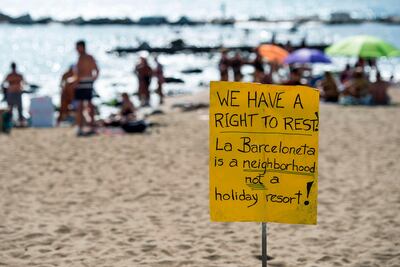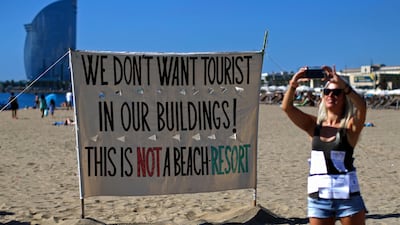Protests against the effects of mass tourism are roiling western European cities like Barcelona, Venice, Florence and Rome — magnets for day-trippers, stag parties, families on package holidays, or mammoth cruise ships.
Officials are trying to respond speedily, introducing new regulations that will curb the worst impacts of the millions of people who storm through these cities every summer.
On Saturday, people formed a protest line on one of Barcelona’s beaches, claiming it was being used like “a resort” by tourists who wanted to sleep off drunken binges. They also held up signs decrying the effects of home rental services like Airbnb. “Tourists stay at hotels. The apartments are for living in,” one notice read.
Last month, 2,000 Venetians participated in a protest march, pointing out that so many residents had fled that the remaining 54,000 were far fewer than the approximately 100,000 tourists in the city each day. Roughly 34 million tourists descend upon Venice each year.
The protesters targeted cruise ships in particular — large, floating palaces that steam through Venice’s canals, dock for a day or two, and unleash massive crowds of tourists upon the city. More than 600 such ships sail through Venice every year.

Jane da Mosto, the executive director of “We Are Here, Venice”, a group that pressures authorities to consider residents’ needs more deeply, called this model “bite and run tourism”.
Few visitors to Venice seek to truly appreciate the city's culture and heritage, she told The National. "Many people come for a cheap escape … or simply just to be able to say they've been to Venice," she said. "But Venice is a fragile city, it is disintegrating under all this use and abuse."
Large tour groups have begun to venture into every corner of the city, Ms da Mosto said. “Recently, groups have started coming to the Rialto market, where I do my shopping, and it is not only difficult with these extra crowds, it is also a horrible feeling being watched like a zoo animal while I decide what to make for dinner!”
Marco Secchi, a Venetian photographer who has extensively documented his city, said tourism had contributed to a housing problem.
“Due to Airbnb and other portals, there are no apartments available for long-term stay,” he said. Owners now prefer to let their flats to tourists rather than locals because they can charge tourists a higher rate.
“This is why the city is losing its residents,” Mr Secchi added.
Demonstrations have also broken out in the Spanish resort town of San Sebastian, in the Italian capital, Rome, which is suffering from such a severe drought this year that its famous fountains have been turned off, and in the Croatian city of Dubrovnik, also a popular docking stop for cruise ships.
Cities have been caught unaware by the rapidity with which the tourism industry has changed, said Jace Quick, the founder of Cities Direct, a British agency that specialises in urban holidays.
“In 2000, there were still a limited number of flights across Europe, especially from smaller regional airports,” he added. “Over the last 17 years, this has totally changed.”
In some cities, “visitor numbers have increased dramatically”, he said. “When the pace of change increases the local authorities can take a little time to react.”
This year, a number of European cities have instituted new rules for tourism. Barcelona has banned Segway tours and implemented tighter inspections of unlicensed Airbnb rentals. On Monday, the president of the city’s chamber of commerce said the city was now considering a “tourist tax” on tour operators.
In Venice, takeaway food stalls and new tourist accommodation have been banned in the city centre. The city has also installed people-counters at some of the most popular landmarks, such as St Mark’s Basilica, to regulate tourist traffic.
Florence, meanwhile, is hosing down the steps outside its famous churches and cathedrals to deter tourists from sitting on them and eating lunch. It has also launched #EnjoyRespectFirenze, a campaign that asks tourists to respect the city’s residents.
Striking the right balance is tricky, however. The fiscal health of these cities is dependent, to varying degrees, on tourism, which creates jobs and customers.
For Barcelona, tourism is important but not life-giving. The industry accounts for 17 per cent of the city’s economy and employs around 90,000 people.
But for Venice, tourism is vital. One of the aims of “We are here, Venice” is to research “economically viable alternative to mass tourism”, Ms da Mosto said. “Many local businesses have already been extinguished or moved out of the city.”
She would like to see the city’s residential population grow, something that will happen only if tourist numbers are restricted and accommodation regulated.
Mr Quick said his agency makes it a point to use “mainstream transport, hotel providers and local guides that are contributing directly to the local economy”. As cities catch up to the momentous changes in the sector, he believes, “over a longer period, this balances out and equilibrium is restored”.
“Nobody in Venice wants to stop the tourism,” Mr Secchi added. “At the same time Venice must be protected for future generations, and for humanity.”

